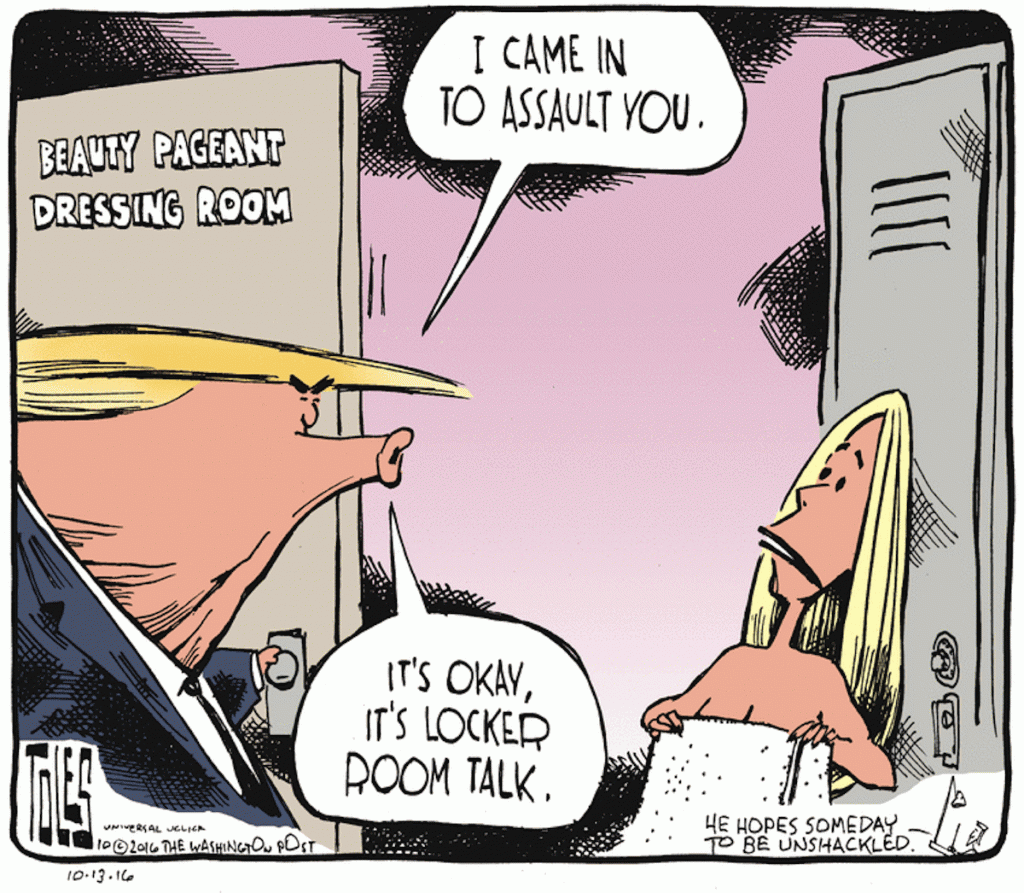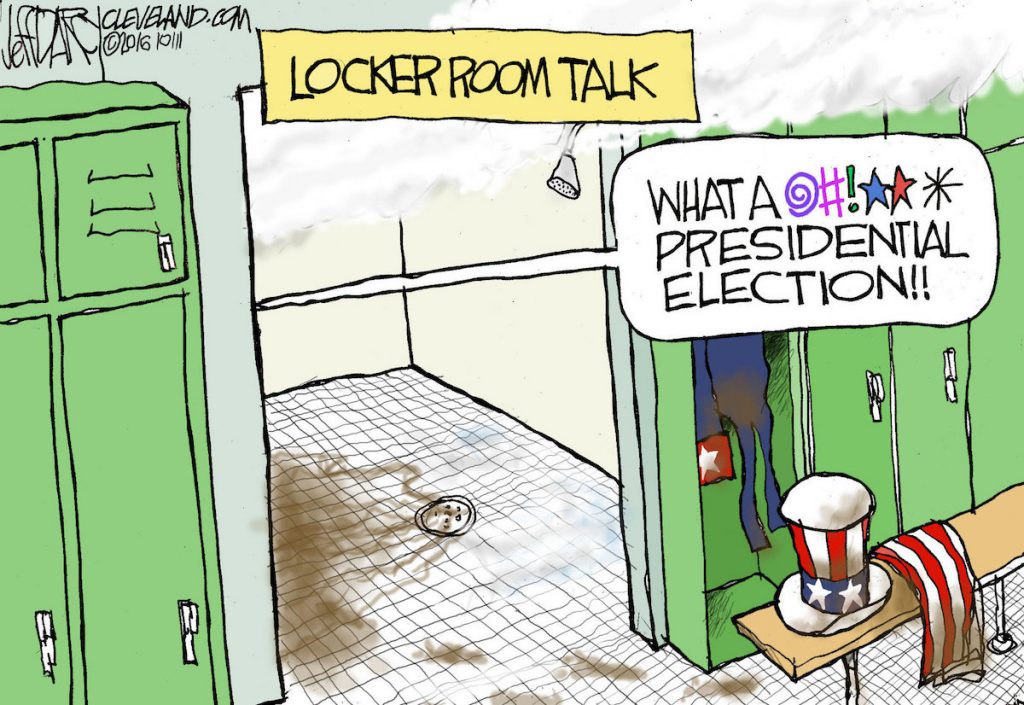If you thought “locker room talk” was just an American phenomenon, where white men make vulgar and aggressively misogynistic statements while in the company of other men, think again.
Jean is Chinese, Singaporean, and in her thirties. She’s also spent the last six months working in the engineering industry where men outnumber women 9 to 1.
Already, she’s both witnessed and borne the brunt of countless inappropriate comments, derogatory statements, and lewd remarks made by her male colleagues. Often, they do so openly while in the presence of female colleagues.
One could argue that in overwhelmingly male-dominated industries, this is simply the norm. It’s just how guys bond.
And in Jean’s experience at least, offensive words have never translated into inappropriate behaviour. Which then begs the question: is it really that bad?
If it’s just talk, what’s the fuss about? “We should let boys be boys,” some might say.
Or should we?
Jean: The worst I’ve encountered was when I worked at an open house for a luxury car company. Sitting at the same table as me was a customer who had a bit of a reputation for being a playboy. He started talking openly about someone whom he had slept with in a lewd manner, using phrases like, “You fuck her ah, the whole world will know about it.”
When he noticed me sitting there, he paused and said, “Sorry, don’t mind me talking like this…” before carrying on as per usual.
In one company I was employed in, a few guys had the habit of highlighting certain female colleagues who had large breasts and openly graded girls based on their looks.
Two colleagues also once told me how frequently they would have sex with their wives. One proudly announced to me that he has sex every night. Why would I want to know such a thing?
A colleague also recently shared how he would only pick up ‘chiobus’ for his Grab car. He then showed us an example of someone who he’d never pick up based on her looks. The photo was of a middle aged Indian woman.
R: How often would you say such talk occurs?
J: Frequently. In some social groups that I hang out with, it could happen every week.
R: And how does hearing these things make you feel?
J: Uncomfortable, for sure. However I’m sad to say that over the years, I began hearing it so often that I started to believe that it was normal for men to say such things.
R: So when did you start to realise that it wasn’t normal?
J: During the US Presidential elections last year, some of my JC friends (half of whom have migrated overseas) commented in a Whatsapp group about how some of Trump’s comments were degrading to women.
I disagreed saying that I hear such talk all the time on TV, in NS camps, and from my colleagues. They were disgusted with me and couldn’t believe that I had such low standards.
One friend was so offended that she even left the chat group. After more disagreements over political views, she eventually severed our friendship of 17 years.
That was the key turning point that got me thinking more about why I feel the way I do, whether my values have been eroded over the years, and whether I ought to have more self respect for who I am as a woman.

J: Those who have grown up in Singapore and are more introverted tend to not think much of it.
Those who are educated overseas and are who are generally more opinionated think it is childish and lame, if not disgusting.
R: Why do you think your male colleagues have no qualms voicing such thoughts in front of women like yourself?
J: I guess that it’s to do with their upbringing. No one ever taught them that it is inappropriate to say such things in front of women.
In primary school, I recall that I once had a classmate who openly called a fellow classmate a prostitute in front of everyone when the teacher wasn’t around. If they can start so young, such behaviour gets ingrained and they carry on thinking nothing of it.
They probably don’t think what they’re saying is potentially hurtful, and my impression is that they don’t care.
R: And how do you normally react when you hear men say these things?
J: I’ve never confronted them about it. I’ve always just laughed along or listened quietly. Once, in an attempt to fit it, I tried stooping to that level and cracked a lewd joke about myself. I regretted it instantly.
I shouldn’t feel the need to fit in at the sake of my dignity and self respect.
R: Why don’t you speak out?
J: Oftentimes I’m just one girl at a table full of of men and I feel powerless. Also I’m afraid that if I speak out, they might think that I’m rigid or that I can’t take a joke.
I don’t want to seem like a wet blanket and make things awkward when everyone is just trying to have a fun conversation over a meal.
R: Do their words affect how you view your colleagues?
J: I would just classify them as “Hum Sup” (dirty old man) and probably respect them less to the extent that I’ll try to limit my interactions with them.
At the same time however, avoiding them becomes difficult as I have to work closely with them and so I just have to accept it and get along with them for the sake of my job.
R: You mentioned that you have yet to confront your colleagues about the things they say, do you think you might one day?
J: I’m not sure if I’ll directly tell someone off. I might make it known that I don’t enjoy hearing such jokes or conversations by not laughing along, getting up and walking away.
Perhaps I’ll simply ask them to explain to me why they think what they’re saying is so funny.
R: Maybe you could explain what it is about locker room talk that you find so wrong or offensive?
J: That I feel, is the hardest question to answer because it is highly debatable. It sits on the line of moral standards and it is difficult to know where to draw this line. As with all things, some people will be more tolerant and accepting than others.
Personally I cannot tolerate jokes about rape, yet many comedians like George Carlin and movies portray it as something to laugh about. How many people actually laughed when they watched the famous (male) rape scene in Pulp Fiction? I think locker room banter becomes unacceptable when it crosses this line. My line and not necessarily others.
It also crosses the line whenever it implies something deeper, like when my colleague once joked that I must check my husband’s phone to ensure that he isn’t checking out other girls. It implies a lack of trust in our marriage, that there is unhappiness, that my husband is unfaithful or that I’m a control freak.
I don’t find it funny because the reality is, such things are neither funny nor true.
It’s also offensive because women are basically objectified, and from this stems all sorts of violence and injustice. The kind of locker room talk I hear at my workplace is probably of the seemingly harmless type, at the opposite end of the spectrum. But the very fact that they all fall along the same spectrum is something to think about altogether.

And it’s not a simple matter of boys just being boys. We can always argue that we don’t mean everything we say and that actions do speak louder than words.
On that note however, it’s important we recognise that elements of ‘harmless’ locker room talk are similarly rooted in the same culture of sexism and misogyny that also gives rise to incidences of sexual and physical assault on women.
And the only hope we have of changing it, is to first recognise that even the smallest of words matter.






